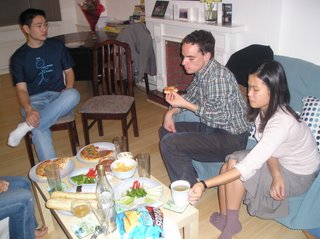“John Sutherland has calculated that to read all the novels currently available, allowing three hours per novel, would take 163 lifetimes and, he adds, ‘very dull lifetimes they would be’.”
(
London Review of Books, 5th October 2006)
Having been reprimanded by a friend today for not sending out an email to say so, I’m back in Cambridge and I’ve begun a PhD course. In classic Cambridge style I was inducted on Wednesday to the PhD course and was informed on Friday that I had passed the MPhil course which was a condition of admission to the PhD. More interestingly, I’m now living in Link House, alongside people of 19 nationalities. It’s especially interesting to mingle in the kitchen and see what people are cooking. We’ve had various welcome activities for people in the house, including a trip to the countryside today in a minibus. I’m also trying to enhance my domestic skills in such things as putting the right things in the washing machine for the right amount of time.
I have been assigned four postgrads new to Christ’s as my college children. My children are an amiable bunch. I suspect some are older than me, which raises some logical (or biological) difficulties. They are also of varied nationalities, which makes for an interesting family. We decided that the way to come up with a research topic for an arts subject was to select an abstract noun at random, such as ‘freedom’ or ‘justice’ or ‘tranquillity’ and then couple it with a particular historical or social context: ‘The Concept of Tranquillity in 13th-Century Japan’, ‘The Quest for Justice in Cyberspace’ etc.
Walking into college the other day I noticed that I was wearing odd shoes. Odd, that is, in the sense of non-matching, rather than either being strange in itself. One old shoe and one new shoe, similar in style, but one clearly old and faded and the other clearly shiny and new. Other than reflecting my own ineptness, this perhaps signifies our general inconsistency as human beings, with non-matching aspects of our personality, our skills and our character, some bits of us seeming battered and worn (or well-lived in, seen from another point of view) and some bits of us seeming bright and pristine (and perhaps untested). The Apostle Paul tells us to take off the old self and put on the new self, suggesting that there are bits of both in our experience. This is sometimes spoken of as a fact in the past tense, as something which has taken place: we have been made new and left behind our old ways. It is sometimes given as a command in the present tense: we have to choose to live in the light of the new nature and get rid of the baggage of the old.
Working out the relative proportions of the old and the new selves in the believer is an exercise which keeps the theologians entangled, as they seek to unpick the paradox that our transformation is at once definitively completed at the cross and at the point of conversion and at the same time ongoing and frustratingly incomplete. Though we can debate in what sense and to what extent the old self is dead, experientially it seems sometimes to be very much alive. Perhaps although our old shoes have been replaced, it is more comfortable for us to stick to the familiar old ways, to wear one old shoe with one new instead of seeking to live in the complete shiny newness of life which is ours.
There are two ways to get back to Link House from the centre of town. One is to follow the street (the old Roman road which runs right the way through Cambridge) up to the hill and turn right at the traffic lights. The other, the greener route, is to walk diagonally across Jesus Green, cross the river via the bridge and walk left down the road. Walking back to college there was a light drizzle. The river seems more alive when you can hear the torrent of water at the weir fed by the rain. The Cam seems to meander at times like a student drifting through existence in a haze, as they often do. This is especially the case in the summer. However, traversing the iron bridge over the weir, it somehow seems appropriate to have insistent rain brushing one’s hair. (Wikipedia lists
21 bridges in Cambridge, all different in character)
As I crossed Jesus Green there was a huge rainbow, arcing right over the pathway, a whole rainbow such as we rarely see, towering above the green and seeming to frame the pathway like an arch through which I was walking. This may sound fanciful, but it felt as if I was walking through the archway of God’s promises into the future he has for me (the rainbow being a sign of God’s promise and his covenant faithfulness on which we can depend). God's blessings to us and our usefulness to God do not rest on our own ability or character or inherent goodness but on his own gracious promise to us. God’s promises surround us and lead us into a bright future even though we’re inept and imperfect and inconsistent.
“As a father has compassion on his children, so the LORD has compassion on those who fear him; for he knows how we are formed, he remembers that we are dust” (Psalm 103:13-14), and that we don’t always know where we’re going, and that we don’t know how to make the washing-machine work, and that we stumble and fall from time to time, and that we wear odd shoes. And the rainbow of his faithfulness still towers over us, framing the pathway into the future he has prepared for us.







